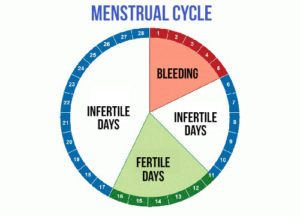
Pic source: Step to Health
Been trying for a baby unsuccessfully? Have you tried timing your sexual intercourse to coincide with your fertile window? I realize that this makes sex sound very mechanical and amps up the already high stress levels of the couple who’s been trying hard for a child, but hey, if this helps avoid a trip to your friendly neighbourhood Fertility Specialist (although, I hear they are very friendly), then why not? Especially, if you’ve already had a few unsuccessful runs and are beginning to feel concerned.
Firstly we need to understand why sex needs to be timed to perfection when you’re trying to have a baby, well at least to near perfection! The egg (henceforth called oocyte) survives for ONLY 24 hours after its release from the ovary. This is called ovulation. Sperm, after being ejaculated into the female genital tract, is able to SURVIVE FOR UP TO 5 DAYS in the aforementioned tract. Therefore, having sex, say, 9 days before or 2 days after ovulation is NOT going to lead to pregnancy. The sperm needs to fertilise the oocyte within 24 hours of the oocyte’s release for a pregnancy to occur.
Timing sexual relations is easiest for women with clockwork (regular) menstrual cycles. It involves simple subtraction. Normal menstrual cycles can vary in length from 21-35 days. One menstrual cycle is calculated from the first day of menstruation of the current cycle to the day before menstruation of the next cycle. Technically, ovulation occurs 14 DAYS BEFORE the next menstrual bleed. So, a woman with a 28 day cycle, most likely ovulates on day 14 of her cycles. Likewise, a woman with a 35 day cycle, most likely ovulates on day 21 of her cycles.
This mathematical model can still be applied in women with slightly varying menstrual cycle lengths, for example a cycle ranging 25-29 days. Ovulation, in such cases, would likely occur between days 11-15 of the menstrual cycles.
Now that we’ve understood how to calculate the likeliest ovulation day, let’s move on to the fertile window. Basically, a couple’s fertile window is 5 days before the predicted ovulation day, including the day of ovulation. Sex can then be planned to occur within this time frame. If the couple should find that having multiple days of sex within this window too troublesome, then the best days for success can be narrowed down further still. This would be from 3 days before the predicted ovulation day, including the day of ovulation.
Heard of the ovulation kit? Here’s another method that’s pretty reliable for predicting ovulation. It looks similar to the urine pregnancy test kit. It’s available from most pharmacies and online stores. And, there’s a variety of brands to choose from. It basically tests a hormone (luteinizing hormone) from the woman’s urine which rises 24-36 hours before ovulation occurs. A woman can start testing herself 2-3 days before her predicted ovulation until her test kit turns positive. Talk about timing sex to perfection! No guesswork involved here.
Notably, a large variety of ovulation predictor apps are readily available for download for those of us who are more inclined towards them. These would also work best if one’s menstrual cycles are relatively regular.
All said and done, if the couple is still having a healthy, joyous and wondrous sex life, then having sexual relations every 2-3 days once is still the preferred method compared to any app, kit or mathematical formula. This ensures that sperm is always readily available within the woman’s reproductive tract, to fertilise the oocyte once it’s released. This eliminates the stress of timing sex to precision. Placing a big red X on the kitchen calendar, marking your fertile window over the next 6 months, unfortunately, can serve as a passion-killer for some couples.
On the other hand, for those women experiencing irregular menstrual cycles, it is highly likely that you are not ovulating regularly. This is mostly remediable; however, will need a visit to your friendly neighbourhood Fertility Specialist, for a discussion on next possible steps in your quest for parenthood. The sooner, the better the outcome.
Dr Sumithra Devi Valiapan is an obstetrician, gynaecologist and fertility specialist.
[This article belongs to The Malaysian Medical Gazette. Any republication (online or offline) without written permission from The Malaysian Medical Gazette is prohibited.]
